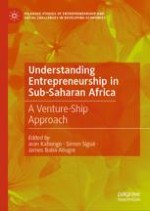2024 | OriginalPaper | Chapter
6. Effectuation and Bricolage and their Applicability to Sub-Saharan African Entrepreneurship
Author : Michel Rod
Published in: Understanding Entrepreneurship in Sub-Saharan Africa
Publisher: Springer Nature Switzerland
Activate our intelligent search to find suitable subject content or patents.
Select sections of text to find matching patents with Artificial Intelligence. powered by
Select sections of text to find additional relevant content using AI-assisted search. powered by
